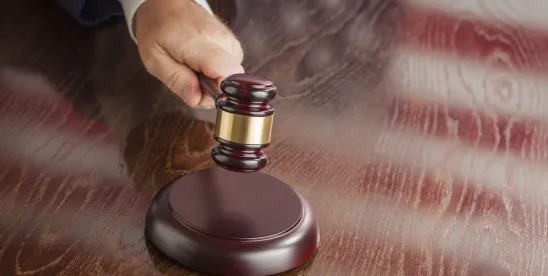The recent flurry of high-profile cases—including the convictions of Sam Bankman-Fried and Rust armorer Hannah Gutierrez-Reed, as well as the hush-money trial of Donald Trump—has brought widespread attention to the power of the jury in the American justice system.
But while most court proceedings are public affairs, the privacy of the deliberation room remains fiercely guarded. As much as attorneys and their clients may wish otherwise, it is impossible to sneak into the jury room and eavesdrop on deliberations as they happen. Like any other observer, they must wait until a verdict is reached to know the outcome of their case. And, if that is where it ends, the dryly delivered verdict is all they ever know. They never answer the most tantalizing questions of all: why and how?
Thankfully, one method offers the next-best thing to spying on deliberations: the post-trial interview.
Assuming the judge grants permission and attorneys follow the appropriate guidelines, post-trial interviews (also called “post-verdict interviews”) can be an incomparable source of information. Properly conducted, they provide each juror a space to candidly discuss their thoughts, decision-making, and take on the group’s dynamic. Counsel can obtain direct feedback regarding trial strategies, attorney performance, key themes and arguments, perceptions of witnesses, and the effectiveness of graphics or demonstratives. This feedback can inform future litigation strategies or even post-trial motions and appeals.
On the other hand, improper interview efforts can waste the time of jurors and interviewers alike or even earn you a stern admonition from the judge for juror harassment. With this in mind, we have outlined 12 best practices for conducting respectful, successful, and thorough post-trial interviews.
1) Research the Rules
The first step to a successful interview is to research the local court’s rules beforehand, as regulations about conducting them vary widely. Some jurisdictions have firm statutory procedures or ethical guidelines to govern inquiries with the jury. Although many venues permit post-trial interviews (provided that certain conditions are adhered to), some courts explicitly prohibit them, and any judge ultimately has the power to forbid the practice. Federal courts also tend to place strict limitations on the scope of juror interviews, in the interest of safeguarding the administration of justice.
2) Secure Permission
Even if you are confident that your trial venue permits post-trial interviews, it is always advisable to seek the trial judge’s consent before proceeding. In fact, nearly all district courts require counsel to request the court’s approval. Some courts require that the requesting party make a demonstration of “good cause.” When you get the OK, consider also asking the judge to advise jurors that they can discuss the case with others once a verdict is reached. When contacted, jurors often question whether they are even allowed to talk to the trial team or trial consultants following a verdict. Hearing explicit permission from the judge may make them more comfortable participating.
3) Consider Contact Methods
Some jurors, especially younger ones, may be unwilling to pick up a call from an unknown number and may not even check their voicemail regularly. Staggering calls and text messages is often a more effective contact method. Whether you send a text or are forced to leave a voicemail, be prepared to provide enough context for the purpose of your message so jurors do not assume you are a telemarketer or scammer.
4) Do Not Harass Jurors
It is not uncommon to make multiple attempts to contact a single juror. That said, it is paramount that you do not make the juror feel harassed. Try contacting from different numbers, do not call or text more than once per day, and consider taking a day off between attempts. And if a juror is not answering repeated contact attempts, draw the line—at a certain point, a lack of response must be considered a refusal.
5) Be Flexible with Scheduling
When will you call the jurors? It is important to be aware of job schedules. If you expect to reach people during standard 9-5 business hours, you will usually be disappointed. The most appropriate—and respectful—way to begin any post-trial interview is by introducing yourself, thanking the juror for their time and service, briefly explaining the purpose of your call, and then asking the individual if it is a convenient time to discuss the trial. Be understanding that some jurors may not be able to interview on the spot; if that is the case, offer to reschedule for a date and time that fits their schedule, and assure them that you or a colleague will reach out to them at that time. Additionally, be cognizant of the reality that some jurors perceive these interviews as an imposition (especially if they just completed a lengthy trial). In recognition of their valuable time and insights, some interviewers offer a small monetary incentive to participate.
6) Never Pressure a Juror to Talk
This seemingly simple rule can be easy to overlook, especially in the aftermath of an unexpected trial outcome. Although the impulse to gather as much information from jurors as quickly as possible is understandable, it is critical to recognize that some jurors may not wish to participate. Should the juror decline to be interviewed altogether, accept their answer as final. Do not try to negotiate or push back (e.g., “Would you just answer three questions then?” “What if I promise that this won’t take more than five minutes?”). Thank them for their time and end the call. If a juror seems hesitant but does not refuse outright, you may be able to put them at ease by telling them that they do not have to answer any questions that make them uncomfortable and that they can wrap up the interview at any time.
7) Give Them a Reason to Engage
Many times, jurors appreciate how their feedback can somehow benefit the court system. Having participated in a trial, they often feel a sense of investment in the system and are eager to share their thoughts on their experience. One way to tap into this inclination is to explain that the interview will help you learn for the future. Avoid laying it on too thick, but let the jurors know how beneficial their feedback can be.
8) Record (with Permission)
For accuracy, recording post-trial interviews digitally, with permission from the juror, is always best practice. When requesting permission to record, you will have more success if you explain that the purpose of recording is to avoid missing any information—and to help move the interview along faster! If the juror still refuses the request for a recording, respect their final decision and do your best to record verbatim notes; it is okay to pause and hear their full response, type your notes, and ask for clarification when needed. Should you receive permission and begin recording, be sure to state for the record that the call is now being recorded. It is also wise to take notes regardless, in case any technical difficulties arise with the recording process or audio file.
9) Establish Rapport
There are a multitude of reasons to connect with your jurors; one is that they will be more eager to answer your lingering questions after trial. If you are an attorney looking for “hallway conversations” with jurors following trial, they will be more likely to stay back and talk with you if you have established rapport. This connection can be developed as early as voir dire, and the more you are able to build it during your advocacy, the more likely it is they will talk to you once the trial is over. Interviewers who were not present at trial can still establish rapport by presenting themselves as warm, friendly, appreciative, and “human” during the initial portion of the call. No need to stick rigidly to a script—this can make you seem stiff and impersonal. Instead, favor open-ended questions and “active listening” to help put the juror at ease. Finally, because you also do not want jurors pulling punches to save anyone’s feelings, consider reminding them up front that no matter their opinion (or who it is about), their complete honesty is valued and encouraged.
10) When In Doubt, Delegate
In some instances, it can be helpful to delegate your interviews to paralegals, administrative staff, or a third party such as trial consultants—especially if you are expecting some critical feedback. Jurors may be more willing to speak candidly if the interviewer is not one of the trial attorneys, especially one who represented the side the juror found against.
11) Be Prepared Yet Flexible
Approach every post-trial interview with a plan. Write out an interview protocol that touches on the key questions and issues, but avoid thinking of it as a script. Instead, consider it a guided conversation. Starting with broader, “big picture” questions can help get jurors talking and often ends up soliciting information you had not even thought to ask. From there, let the responses flow naturally, follow up as needed on interesting points or for additional details, and be willing to skip around (or skip questions altogether) based on what they bring up. Repeatedly asking questions the jurors have already answered elsewhere increases the interview time and can cause them to feel as though they are not being listened to.
12) Take Your Time, but Be Mindful of Theirs
Do not rush jurors through the interview—make sure you have enough time blocked off to let jurors elaborate upon what they considered important at trial. On the flip side, some jurors may make it clear that they only have a limited amount of time available. Rather than trying to speed through the full protocol, which will likely net you shallow feedback, determine your most essential questions in advance and jump right into those.
In Conclusion
Post-trial interviews offer an avenue to promptly learn from your trial experience and uncover why jurors held certain positions and how their decisions were made. By following the guidelines above, you can get the most out of this valuable research tool.
A version of this article was also published on Law360.com. Republished with permission.
This article was co-authored by Brianna Smith




 />i
/>i

